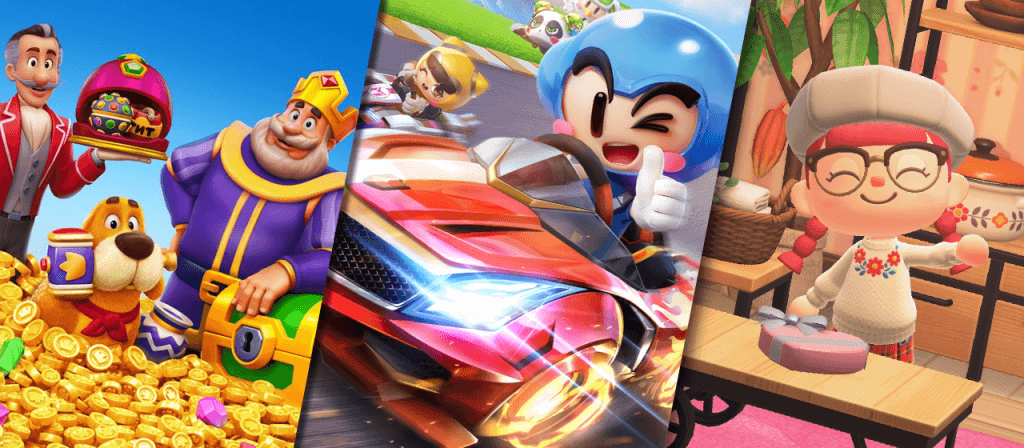In this episode of the Mobile GameDev Playbook, Ariel Coppes, Lead Game Engineer at Ironhide Games, talks about the success of the Kingdom Rush franchise with GameRefinery by Vungle analyst Erno Kiiski and our host, Jon Jordan.
![]()
![]() Spotify, BuzzSprout, TuneInRadio, iHeartRadio
Spotify, BuzzSprout, TuneInRadio, iHeartRadio
– If you enjoy the episode, remember to hit subscribe!
We delve into making games for the premium market, releasing games cross-platform, stepping into F2P games, and the highs and lows that come with developing a franchise of successful mobile games.
You can also watch the episode on YouTube:
Topics we will cover in this episode:
- History of Ironhide Games and Kingdom Rush
- The Tower Defense genre and why it has worked so well
- Monetization and premium games
- Games as Service and F2P
- Community reactions
- Cross-platform
- Adapting to different markets
- Junkworld and closing remarks
Read transcript
Introduction
[00:00:03] Jon Jordan: Hello and welcome to the Mobile GameDev Playbook. Thanks for tuning in to another episode. This podcast is all about what makes a great mobile game, what is and isn’t working at the moment, and all the latest trends. I’m your host, Jon Jordan, and in today’s episode, we are drilling down how to create a winning mobile game franchise, make a series of games over many years, look at different types of monetization, and keep your community together over time. And joining me as a regular guest is Erno Kiiski, Chief Game Analyst for the US at GameRefinery by Vungle. How’s it going, Erno?
[00:00:38] Erno Kiiski: It’s going great, thanks, Jon, how are you?
[00:00:40] Jon Jordan: Yes, good. Our special guest to drill down into the subject is Ariel Coppes, the lead game engineer at Ironhide Game Studios in Uruguay. How’s it going, Ariel?
[00:00:52] Ariel Coppes: Hi, how are you? I’m doing great.
History of Ironhide Games and Kingdom Rush
[00:00:55] Jon Jordan: Good. We’re going to start off really tumbling down into Ironhide and the games it’s made over the years, but can you give us a potted history of Ironhide for people who don’t know very much about it?
[00:01:11] Ariel Coppes: We are mainly known for Kingdom Rush, our main game, our main franchise. We started developing like, I don’t know, 12 years ago, and it was a big hit on browsers in Armor Games at that time. A lot of people played that game. Then we started releasing the game for mobile. At the time, iPhone was the next big thing, I suppose. The mobile was more in stores, and mobile games were starting, so we had a lot of luck. We released Kingdom Rush for iPhone, with this big feature in the store, so tons of players were playing it, so it was great. That is us. Then we kept working on the Kingdom Rush franchise, and we started creating franchises like Ironminds, for example.
[00:02:24] Jon Jordan: I’m going to go through the list with people who don’t know because you really have worked hard at it. Kingdom Rush was the first one, a tower defense game back in 2011. I don’t know if we can remember mobile games back in 2011, Erno? Seems a long time. Again, it seems interesting then as that was just on the cusp of free-to-play, so point out that era, and it didn’t come from the mobile space, it came from browser space, and you put it out as a premium game, which is something we’ll talk quite a bit about. You guys have been quite focused on that even as other things have moved to free-to-play, but let’s go through the list.
We got Kingdom Rush in 2011, Kingdom Rush Frontiers in 2013, Kingdom Rush: Origins in 2014, Kingdom Rush Vengeance in 2018, and then last year we had the Apple Arcade game, Legends of Kingdom Rush. You’ve done some other games maybe we’ll discuss, but there’s quite a selection of games. All of them were released as premium games, although the original Kingdom Rush is now available as free-to-play.
Just in terms of that basic structure, you’ve been very busy creating a franchise. How do you as a game studio manage to release that amount of games and make them different enough that the fan, you obviously have a really hardcore fanbase, that they really like them, but they obviously have to be different enough not to be too weird and have to be similar enough that the people who played the previous game go, “This is the thing I love about it.” One of the problems with sequels is getting that really nice balance of new stuff and old stuff and exciting stuff. How do you think you’ve approached that over the years?
[00:04:11] Ariel Coppes: We didn’t know exactly the franchise would be so successful over time. When we normally start working on a game, we always follow our core values of making games we love to play. We know that we want to do stuff that people want to keep talking about, but it was a bit of luck with Kingdom Rush. The important thing was it was a great game, and people wanted more content, so we kept giving more content for them.
As you say, Kingdom Rush Frontier, for example, the second part of the game, was almost the first Kingdom Rush with small changes but an all-new setting because it was the same world but a different point in time, but it was what people were expecting, same game with more content. We keep building that over time with the next games. For example, Origins is the prequel of Kingdom Rush previous to the first Kingdom Rush, and we trust our staff, and they like it. We think about building something that we like, and we want to build things that people keep talking about in time. I suppose that is part of the secret, I don’t know, but we were really lucky with Kingdom Rush.
The Tower Defense genre and why it has worked so well
[00:06:08] Jon Jordan: I think also starting off with the tower defense genre, which at the time was very popular but not so popular now. I guess you were making games in the really popular genre when lots of tower defense games were in, then people started making free-to-play tower defense games that just weren’t so popular, and you were still making paid tower defense games, so you got the best of both worlds. You were popular, successful with lots of things with that, and then you just kept going, and there weren’t that many tower defense games out there. Why do you think tower defense worked so well?
[00:06:43] Ariel Coppes: Our communities expect us to build what we build, so we never change that, but we are now testing with a new free-to-play game, but with all the previous Kingdom Rush, it was what people expected. We keep doing that. In some way, it helps us build what we do best with the internal game content because sometimes, when you try to monetize the game differently, you start doing some game design changes and maybe affect the game or what the people expect, so it worked for us. But we are also exploring other monetization models because we have to adopt them somehow. With Kingdom Rush, even though most people were migrating to free-to-play models, it was working until now for us in the premium model.
[00:07:51] Erno Kiiski: Something that comes to my mind on tower defense makes it quite like a still unique and outlier genre in the whole mobile market that if you look, it’s still on the biggest games in terms of market share in the market. Those are mainly those Bloons games from Ninja Kiwi, and like Bloons TD 6, it’s a premium, there’s a premium purchase that you have to make, and it makes about 50% of the genre’s revenues, and it’s a premium game. It’s probably one of the last ones of any genre to have an actual premium game as the top game.
Of course, there are IAPs in that game, but there’s still the premium hurdle that you need to purchase first to play the game. Really kind of an outlier genre also still in the market.
Monetization and premium games
[00:08:4] Jon Jordan: Some things I think are coincidental, but obviously some sort of game design element there where a well-balanced tower defense game is quite abstract in terms of the strategy you do how you level stuff up or where you place things. That’s the joy of a tower defense game, isn’t it? You basically destroy the last enemy by updating everything. Maybe that’s just me and my OCD thing. You want to be as efficient as possible in a tower defense game. You really want to have as much money as possible and not update everything and use all the slots.
If you play it that way, that is broken potentially by using in-app purchases, so it has a cleanness on the game design side that it’s fixed to the premium monetization. Obviously, you can play with free-to-play, but that breaks that magic if you’re really into tower defense games.
[00:09:55] Ariel Coppes: It happened for us with the new game with the Legends of Kingdom Rush that at some point, we were deciding how to monetize it. It was fighting against the game we were developing because it is some kind of roguelike game, and we were thinking if we added in-app purchases inside the game, you’re probably thinking about the game being designed for you to buy stuff like paywalls or something like that. Building this is super hard, so you have to pay money to keep going.
That was going against the game. We changed the model. We had the luck of working with Apple Arcade, and we could develop a game without sacrificing what we were doing with in-apps or stuff like that. You can play the experience only by paying upfront one time. Well, no, subscription, but you understand what I mean.
[00:11:18] Jon Jordan: That’s what Apple Arcade was designed to capture, wasn’t it? I guess Apple felt those game developers wanted to make games in a certain way and genres that perhaps didn’t fit into free-to-play. Obviously, you can make any genre free-to-play, but you may lose some core elements, and I guess that was what Apple was hoping to do or is still hoping to do with Apple Arcade, which now has hundreds of games in there. I don’t know, we don’t really have any idea commercially how well it’s done, but obviously, subscription models are how people are consuming media now in general, even on mobile.
Can we talk a little bit about the game you’ve got you’re working on now? It’s called Junkworld, isn’t it? That’s the first game you designed to be free-to-play from the start. How’s that been different from all the other games you’ve made? How have you had to think about getting new skills or potentially new staff members who have experience with free-to-play?
[00:12:29] Ariel Coppes: It’s a different experience for us. We want to experiment with free-to-play because we want to learn what we have to do there, but at the same time, it’s an experiment in some way. We know that if something doesn’t work, we want it to work, even being free-to-play; maybe we have to make a big change at some point. The soft launch has given us great feedback. As I said before, the first difference we had was that people were feeling that the game was being hard, so they had to pay, but then we started to change the balance and start giving them other options.
Now we are getting better feedback from them. Yes, it’s super different for us, but it’s an experiment. We want to understand the market and have one small step in that direction if we have to migrate to make more free-to-play games in the future.
[00:13:49] Erno Kiiski: Is your game also this one going to be mainly focusing on a PVE combat, or is there maybe something like a social PVP element? Because what we have seen or what is really interesting for me in the tower defense market and if you look at as we follow naturally, they’re the biggest games in the market and so on. We have seen these successes of games like Random Dice or Rush Royale, the more recent one, which is actually a tower defense game that has this main PVP element where you’re playing against each other in a 1v1 setting and then your meta side of the game is building a deck like in Clash Royale or so on. What’s the approach that you guys are taking with the new game?
[00:14:35] Ariel Coppes: We are still doing a PVE game because we have a lot of experience in that, and we know we can control the experience, and in some way, we feel that that is what our community wants. We are trying to expand our community to a free-to-play market but also trying to get the same kind of players in some way. This game will be similar to Kingdom Rush, but you are going to have more, in some way, auto-generated. It’s not the word, maybe, but you will have much more content than Kingdom Rush in terms of replayability in the long term, but we don’t have PVP yet for this game.
Games as Service and F2P
[00:15:26] Jon Jordan: More generally, with the free-to-play business model, over the years, it’s not just been about monetization; that’s really been about games as a service and how you build live ops and special events. As we’ve discussed in previous podcasts, now for the biggest games, that’s the constant inflow of content all the time, and it makes the game very dynamic and allows you to retain audiences.
How many of you at Ironhide, you’ve had these premium games, but have those been much more solid games where people just play through the content, and then once they play through them, maybe get updates irregularly? Or are you still with premium games doing things like limited-edition events or updates every week? That seems to be a little bit of a hard thing to do in a premium game. Have you approached that?
[00:16:26] Ariel Coppes: Yes. We own the project. The only thing we do is, as you say, the updates after releasing the game, but this is for a small period of time. It can’t be considered live ops. We are doing some stuff like challenges, but on social networks like saying, “Oh, you have to beat this stage with this tower,” and people are playing it a lot, but it’s not integrated into any of the games. That is a way we could do something like a small step in the live ops direction. We are thinking a lot of that for the new game because we want it to live for a long time. For this game, we expect players to increase over time. We are developing thinking in terms of doing stuff over time like challenges are the main thing, and integrating the game, like daily challenges and stuff like that. That is what people, we suppose, expect for our games to play again and level or a stage but with different conditions and to beat it.
[00:18:11] Jon Jordan: Yes. That’s a good use of content as well, where you don’t have to make more content all the time; you’re basically bringing people back to this level and asking them to fulfill it in different ways. That kind of retains people and doesn’t mean you’re constantly having to make new levels all the time, which I guess is, probably for tower defense games, a very time-consuming process to make a well-balanced level. You keep it like that.
[00:18:39] Ariel Coppes: For our premium games, we also do something like– We have optional content like heroes and towers and stuff, so for some players that want to pay extra, they can play the game again in a different way. A bit different, not so much. It’s another way to add content and keep the game alive, but it’s not too much like what we expect for Junkworld.
[00:19:12] Jon Jordan: Another theme we discussed in the past then, battle passes, is tower defense going to fit with battle passes? Because everyone keeps battle passes now, don’t they? What advice should we be giving from the trends we’ve seen for these?
[00:19:30] Erno Kiiski: Of course, it depends on the implementation and how you integrate it in your economy and so on, but definitely. If we think about the way that some of the genres are known for this more player-friendly monetization where I have more, for example, the shooters which moved to the free-to-play market, usually that’s the feature to think about, and kind of having the same depending on how you implement it, of course, like having the engagement part of it, having the retention part of it.
Engaging if you are creating a game for us, I will see some best loop or something like that. Definitely one of the tools in the big toolkit, often like life service modernization, but it always depends on the actual game that does it actually fits in there.
[00:20:32] Ariel Coppes: Yes, as I said, we are learning a lot with Junkworld. It’s our first free-to-play game focused on live op, so we’re probably experimenting with everything. We are adding a VIP pass right now, something like that, to remove the energy system. Many people are buying, so they are saying in some way that they don’t want the energy system, but it’s okay; we are learning, as I said. Also, I am not part of the team, so I might not know some stuff, but yes.
Community reactions
[00:21:12] Jon Jordan: Do you think because you just have such a history of making premium games, have you found there has been some sort of community reaction against what you’re doing? I guess for some people, even now, some people dislike free-to-play games, and I guess they’ve loved your games to a degree because pretty much all other mobile games have moved to free-to-play, and you guys are stuck very firmly to how you want to make the games. Has there been any? I mean, backlash is probably not quite the right word, but have there been people disappointed that you’re making this move?
[00:21:50] Ariel Coppes: Yes, a lot of people. The thing is, we are not only making free-to-play games; we keep doing what we do best. We are experimenting with free-to-play, but yes, some people don’t like what they see from the outside. They think that making a free-to-play game is probably saying, “We are doing free-to-play from now on.” We always have people who don’t like something, so it’s really difficult to discern and know what to read from that.
For example, now, when you release a game on mobile, people are asking for the game on Steam, and when you release it on Steam, people are asking for the game on Switch. You always have someone asking for something, but the first reaction was that they didn’t expect that with the free-to-play. But as I said, we are also trying to expand our community somehow, and we are trying to adjust the aim so we can get the best from both worlds. I believe we are doing a good job with that, and people that normally love our games are enjoying Junkworld a lot.
[00:23:17] Jon Jordan: I guess you are doing it with the new IP; you’re not taking an existing IP that’s always been premium and then twisting that. I think that’s often when the community gets very upset when there’s something that they feel– Being part of the community is sort of having or at least feeling you have ownership over something and maybe having some sort of social ownership over something. I guess that to be done in the right way. I actually had a question about cross-platform because you have released it on PC and other platforms.
In general, what’s your philosophy about–? I guess you’ve always been a mobile-first studio, but in general, lots of products now are sort of going over lots of different platforms. How do you see that one playing out? For Junkworld as well, how do you see that one working out?
Cross-platform
[00:24:08] Ariel Coppes: For our premium games, we always want the game to be on as many platforms as possible because we want everyone to play. We normally had to change the monetization model in some cases, like Steam; if you buy the game and don’t have anything to buy inside it, we have to add it. It will be difficult for Junkworld because it’s not so translatable to Steam because of the model, and it’s probably something negative for that game. I suppose we are also experimenting with working on–
You say we are mobile-first; I say we are experimenting with a lot of stuff. One of them is free-to-play, and one of them might be a game developer, maybe not for mobile-first. I don’t know if I can answer the question.
[00:25:15] Jon Jordan: Yes. Do you think with Junkworld, we are free-to-play games on Consoles now, so obviously, technically, you could do that? Do you think this particular game would work on consoles?
[00:25:33] Ariel Coppes: No, it depends. It’s probably going to take some time. First, we have to understand the game and learn a lot about the game and make changes. That’s going to take some time for us. We are a small studio, and not everyone is working on that game, so we are going to get some experience some information, and then we will decide depending on how well it’s performing. Normally, for Kingdom Rush, we want to translate to Steam and consoles. It is a lot of work for us even though we are working with Starman Studio for importing games on Steam and then with Switch.
It is still a lot of work. As I said, we are a small company, and this studio is small also, so it takes time for us, but it’s probably something we are going to do in the future depending on the game how well it’s performed. I believe it’s okay to first release it on mobile, which is the biggest player base, and then, depending on that, translate to another platform.
[00:26:56] Jon Jordan: More generally, we’re seeing much more mixing of platforms over time. There were these whole things three or four years ago when mobile got very busy, and everyone then switched into PC or mobile and PC, and now we see consoles are more open as well. It seems that if you have a decent product, it tends to go everywhere now.
[00:27:23] Ariel Coppes: Yes, also the tower defense– Sorry. Go.
[00:27:27] Erno Kiiski: Go ahead, go ahead.
[00:27:28] Ariel Coppes: Also, the tower defense genre is super easy to translate to different platforms, but then you start like, “I don’t mind this is not so easy,” for example because you need a lot of controls, and for Nintendo Switch it’s not so easy to control with a gamepad. Yes, that is something we also have. It’s good for us that all our tower defense games are, in some way, easy to translate to other platforms.
[00:28:00] Erno Kiiski: Yes, definitely. That’s something that is always like– Of course, you can unlock the benefits of having a game across platforms, and you can widen your audience, but then it always depends, many of the mobile games playing a Match 3 on a controller, I don’t think it would find a massive audience, so it always depends on how well that actual experience then works based on the platform.
Yes, definitely, that’s in for more and more companies are trying to do and trying to create this cross-platform experience as for the similar game or same game or even like game with the cross-play possibility to play among each other. It’s playable in both mobile to Console to PC, and you name it.
[00:28:55] Jon Jordan: Particularly, we see mobile browsers I think are particularly strong because they’re both fairly open platforms. The consoles are obviously much more open than they used to be, but there’s still that friction in how you get stuff approved, and being able to share links is clearly easy.
[00:29:17] Erno Kiiski: Yes, definitely. Just cross-play, for example. Mega games like Genshin Impact, for example, you’re not cross-platform play with PlayStation with mobile, there’s no possibility to play with the same account for an example. There are more barriers in cross-platform play, for sure.
[00:29:39] Jon Jordan: I think definitely, as you’ve mentioned, Genshin is the big reminder that for the big names now, you have to do that if you’re a global publisher. There’s a tick box you have to do, and obviously much easier to do than it used to be. When you have a game out there, you want to drive as much audience towards it as you can because that just allows you to spend much more on game development costs in the first place. After all, you can feel you can address the entire audience.
As you’re talking about playable stuff, obviously you guys are based in Uruguay, not particularly; there aren’t many big game developers in Uruguay and Argentina, places like that, but not particularly well-known when you guys came out. Have you found, as most mobile games, do you still have a global audience, or where are the hotspots for your audience?
[00:30:38] Ariel Coppes: First, I joined Ironhide two years after it was created, and for me, it was super fun to know that Ironhide was from Uruguay, too. I was reading in game development forums in Uruguay, at some point, they appeared saying, “Oh, okay, we are releasing our game.” They have a Blogspot all in English, and I expected them to be from another part of the world. It was a big surprise for me to know that they are from here. Our audience, I suppose that we have most of our audience from when we were a game in the browser, we had more games.
The game, as I said, was played by all the world. At that point, browsers were a big thing, and it was free to play it, the game. We had money from playtime or sessions, I don’t know, I don’t remember. It was so easy to play, and the game was great, so almost everyone was playing it. I believe that, in some way, most other people have a great memory of Kingdom Rush. When they see Kingdom Rush on mobile five years later, even though they are not following us year to year, at some point they see Kingdom Rush or something related to Kingdom Rush, and they have a great memory, so they buy it or play it or whatever. I suppose that is our main audience or was so.
Adapting to different markets
[00:32:31] Jon Jordan: Has it, I guess, over the period where Ironhide’s been making games, the big growth has been China, southeast Asia, which is not particularly well-known as a market for premium games. Have you felt that’s a market you haven’t really cracked yet, and maybe something like Junkworld, which is free to play, will give you better distribution, at least in those sorts of markets where they’re just not interested in buying mobile games?
[00:32:59] Ariel Coppes: Yes. We also had to adapt some of our games for that market. For example, in Kingdom Rush, recently, we made a free-to-play version. Yes, it was like a free-to-play version. We updated a bit. Of course, it was not designed for that, but it was adapted, and we are testing in that country, and it’s doing well. The great thing is when it was free to play on browsers also, people from all over the world were playing it and even in China. They did what they had to do to play the game, which was super great. Even if we were making the game premium, they didn’t stop buying it or playing it. Yes, that’s super great.
[00:34:00] Jon Jordan: I thought you were going to say they didn’t pay for it, they just found the hacked version, so it was– [laughs]
[00:34:06] Ariel Coppes: Yes, there are also hacked versions. It was like, you release the game, and the next day of your release, it is already on other networks. The hacked version is already in another place.
[00:34:19] Jon Jordan: Which is why everyone moved to free-to-play space. That was the moral of the story.
[00:34:24] Ariel Coppes: Yes, you can control.
Junkworld and closing remarks
[00:34:28] Jon Jordan: Cool, good. We’re coming to an end. I guess, because Junkworld is the game that you’re working on, have you got a launch date in mind yet, or is this? You say it’s in soft launch at the moment, so you may not be able to tell it?
[00:34:44] Ariel Coppes: I suppose it’s going to be a soft launch until it matches our expectations about the game. Then we will announce the release date, but I don’t know. Maybe there is a release date, and I don’t know.
[00:34:57] Jon Jordan: Okay. There are probably other things you’re working on that you can’t talk about as well, is there?
[00:35:02] Ariel Coppes: Yes.
[00:35:05] Jon Jordan: That’s it. That’s the end of that.
Lovely, okay. Keep an eye on Ironhide’s socials to find out about the secret things they’re working on when they’re not so secret. Thank you very much, Ariel. That was really fascinating to get a dive into what’s going on at Ironhide and how you are changing and building new products. Thanks for your time.
[00:35:27] Ariel Coppes: Thank you so much for inviting me.
[00:35:31] Jon Jordan: Thanks, Erno. Always good to have you on.
[00:35:34] Erno Kiiski: Thank you, thank you.
[00:35:35] Jon Jordan: Thank you for listening and for watching, depending on how you’ve accessed the podcast. Remember, every month, we are talking to the people in the mobile games industry, the biggest part of the game sector, making these incredibly cool products that people play all the way around the world. 3 billion gamers on mobile, so pretty vibrant. Hope you’re enjoying it; please subscribe through your podcast or videocast provider of choice, and maybe give us some feedback; that’d be great. Thanks for watching, and see you again soon.





















